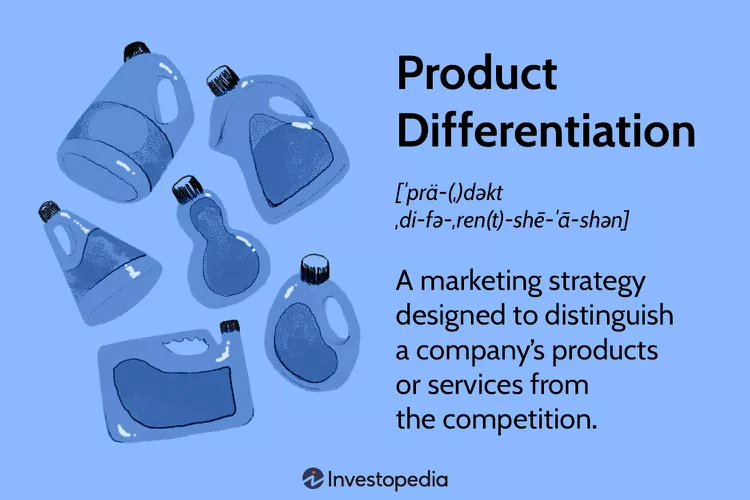Product Differentiation
What is Product Differentiation?

Definition:
Product Differentiation refers to the strategic process of creating and highlighting unique features, characteristics, or attributes that distinguish a product from competitors in the market. It involves developing and promoting aspects of a product that set it apart, making it more appealing and desirable to the target audience. Product differentiation can be achieved through various means, such as innovation, quality, design, branding, customer service, and other distinctive factors that make the product stand out in a competitive marketplace.
Analogy:
Think of product differentiation as a custom-tailored suit. Just as a well-crafted suit is designed to fit perfectly and showcases unique details, product differentiation tailors a product to meet specific customer needs and showcases its distinctive features to stand out in the market.
Further Description:
Product differentiation involves several key components:
Innovation: Introducing new and unique features or technologies that set the product apart from competitors and address customer needs more effectively.
Quality: Emphasizing superior quality and performance to establish the product as a premium or higher-value option in the market.
Design: Creating a visually appealing and user-friendly design that enhances the product’s aesthetics and usability, providing a memorable and positive customer experience.
Branding: Building a strong brand identity that conveys a clear value proposition and fosters a positive perception of the product in the minds of consumers.
Customer Service: Offering exceptional customer service and support can differentiate a product by providing added value beyond the actual product features.
Price: Differentiating through pricing strategies, such as positioning the product as a premium option with higher prices or as a budget-friendly alternative with cost advantages.
Customization: Allowing customers to personalize or customize the product to meet their specific preferences and needs, enhancing its uniqueness.
Why is Product Differentiation Important?
Competitive Advantage: Product differentiation provides a competitive edge by offering unique features that competitors may not have, attracting customers to choose one product over another.
Brand Loyalty: Unique and positive product attributes contribute to building strong brand loyalty as customers develop a preference for the differentiated features and qualities.
Market Expansion: Differentiated products can open new market segments or appeal to a broader audience, increasing market share and sales potential.
Higher Profit Margins: Premium or differentiated products often command higher prices, leading to higher profit margins and increased revenue.
Reduced Price Sensitivity: Products with distinctive features are less price-sensitive, as customers are willing to pay a premium for the added value and uniqueness.
Examples and Usage:
Apple iPhone: Apple differentiates its iPhones through a combination of innovative design, cutting-edge technology, and a strong brand image, positioning them as premium devices in the smartphone market.
Tesla Electric Cars: Tesla differentiates its electric cars by focusing on innovation, performance, and sustainable technology, making them stand out in the automotive industry.
Nike Athletic Shoes: Nike differentiates its athletic shoes through a combination of quality, innovative design, and strong branding, creating a sense of style and performance associated with the brand.
Key Takeaways:
- Product differentiation involves creating unique features or attributes that set a product apart from competitors.
- Building a strong brand identity helps establish a positive perception of the product in the minds of consumers.
- Considering customer needs and preferences is crucial in tailoring a product to meet specific market demands.
- Successful product differentiation provides a competitive edge and attracts customers by offering added value.




